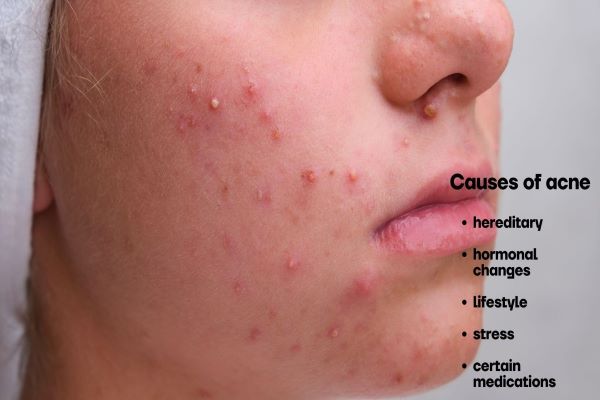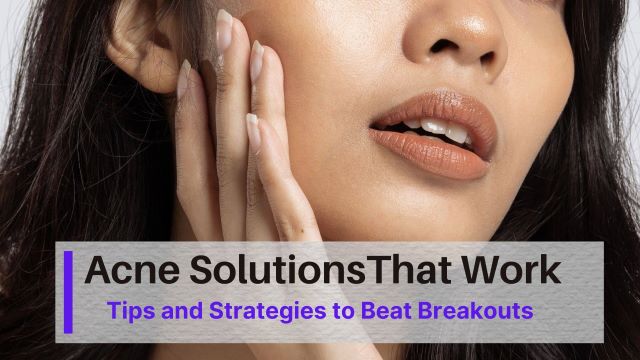Acne is one of the most common skin conditions worldwide, affecting both adults and adolescents alike. While there are many products on the market that claim to help with this issue, it can be difficult to know which acne solutions that work.
Fortunately, there are a variety of treatments and strategies available for dealing with acne breakouts – from prescription medications to home remedies.
In this article, we’ll explore different treatment options in detail as well as provide insight into why certain treatments take longer than others to show results – giving readers an understanding of why patience is key when it comes to treating acne.
Overview of Acne and Its Causes
1. Overview of Acne

Acne, also known as acne vulgaris, is a common skin condition that affects millions of people around the world. It occurs when pores become clogged with oil and dead skin cells, leading to the formation of pimples, blackheads, whiteheads, and other blemishes on the face or body. Acne can range from mild to severe and typically appears during puberty, pre-menstruation, or menopause due to hormonal changes in the body.
2. Causes of Acne
There are several factors that can contribute to acne breakouts including hormones, genetics, stress levels, diet choices, skincare products used, etc.
Hormonal imbalances caused by puberty or pregnancy can cause an increase in sebum production (the oily substance produced by your skin), resulting in clogged pores and subsequent breakouts.
Genetics also play a role as some people may be more prone to developing acne than others due to their family history or underlying medical conditions such as polycystic ovary syndrome (PCOS).
Stress levels have also been linked to increased instances of acne flare-ups while certain foods like dairy products have been known to worsen existing symptoms.
Finally, harsh skincare products or makeup that isn’t non-comedogenic (not likely to clog pores) can irritate the skin and cause breakouts.
Acne Treatments and Strategies
1. Prescription Medications for acne
Prescription medications are often used to treat more severe cases of acne. These medications work by reducing inflammation, unclogging pores, or decreasing oil production in the skin. Common treatments include topical antibiotics, retinoids, benzoyl peroxide, and oral antibiotics.
If over-the-counter medications are ineffective or acne is severe, your doctor may prescribe a stronger medication such as isotretinoin (brand name Accutane). This drug can help clear up breakouts and reduce scarring, but it should only be taken under the supervision of a healthcare professional as it can cause serious side effects.
2. Over The Counter Treatments for Acne
Over-the-counter (OTC) treatments for acne are widely available and often much less expensive than prescription medications. They include cleansers, creams, gels, lotions, and spot treatments that contain active ingredients such as niacinamide, salicylic acid, or benzoyl peroxide.
These products work to reduce inflammation and unclog pores – but it’s important to know which one is best for your particular skin type as some may be too harsh and cause irritation.
Again, it is important to note that OTC treatments may take longer than prescription medications to yield results, hence patience and consistency are pivotal when it comes to seeing results.
2. Home Remedies for Acne
For those looking for more natural solutions to their acne problems, there are several home remedies that may help alleviate breakouts.
These include using tea tree oil, green tea, aloe vera gel, honey, and other essential oils to reduce inflammation and soothe skin.
It’s important to note that these home remedies should always be tested on a small patch of skin first to ensure no adverse reactions occur.
Additionally, they may take longer than prescription medications to show results – making patience and consistency key when it comes to seeing results.
3. Tips for Prevention and Managing Flare-Ups: Lifestyle Habits
In addition to treating acne, there are certain lifestyle habits that can help reduce breakouts and minimize flare-ups.
This includes washing the face twice a day with a gentle cleanser, avoiding greasy or sugary foods, and wearing oil-free makeup and sunscreen.
It’s also important to keep hair clean, as it can transfer bacteria or oils to the skin which can cause breakouts.
Finally, drinking plenty of water and getting adequate sleep are two simple habits that help promote healthy skin and reduce inflammation.
How Long Does it Take for Acne Treatments to Show Results?
When it comes to treating acne, results vary from person to person and depend on the type of treatment being used. Topical treatments such as creams, gels, or lotions may take a few weeks or months to show results while prescription medications can take anywhere from 4-6 weeks to start working.
The length of time it takes for acne treatments to show results also depends on the severity of the breakouts and how well a person follows the instructions provided by their doctor or dermatologist.
Typically, you’ll notice some improvement within the first few weeks, but it may take several months for your skin to completely clear up. It’s important to remain consistent with treatment and not give up if results are slow – as patience is key when it comes to treating acne.
Does it Get Worse Before it Gets Getter?
In some cases, acne can worsen before it gets better. This is due to the active ingredients in many treatments working to lift toxins and impurities from deep within pores.
These ingredients may cause skin irritation, redness, flakiness, and dryness at first – but as the treatment progresses these symptoms should start to improve.
However, it’s best to remain consistent with treatment, as results may be slow; patience is key when treating acne!
When to See a Dermatologist for Acne
When it comes to treating acne, many people find success with over-the-counter and home remedies. However, some cases of acne may require more intensive treatment than what can be provided without medical intervention. In such cases, visiting a dermatologist is recommended.
The American Academy of Dermatology Association suggests that it is important to be proactive about seeing a dermatologist for your acne.
It is also recommended that you visit a dermatologist if you have moderate to severe acne, especially if it is causing scarring or is not responding to OTC treatments.
Additionally, some people may be at a higher risk for more severe forms of acne due to underlying medical conditions or medications, and these cases also require professional attention.
When visiting a dermatologist, they will assess your skin and provide personalized treatment recommendations. Treatment options may include prescription medications, laser treatments, and other professional services that can help clear up acne.
Overall, it’s important to remember that everyone’s skin is unique – so finding the right combination of treatments for your particular skin type may take time and patience.
For this reason, it’s important to take a proactive approach and seek professional help if the issue persists. With the right treatment plan, you can find the solution that works best for you!
Conclusion: Being Proactive, Patient, and Consistent is key
Acne is a common skin condition that can affect anyone, regardless of age or gender. While there are many products on the market claiming to help with acne breakouts, it’s important to remember that everyone’s skin is unique, and finding the right combination of treatments for your particular needs may take time and patience. Being proactive in seeking professional medical advice when necessary as well as being patient and consistent with treatment plans will go a long way in helping you find relief from this issue. With the right approach, you can effectively manage your acne symptoms and get back to feeling confident about your appearance!
Leave a comment below if you have any questions or additional advice.
Thank you for reading!
